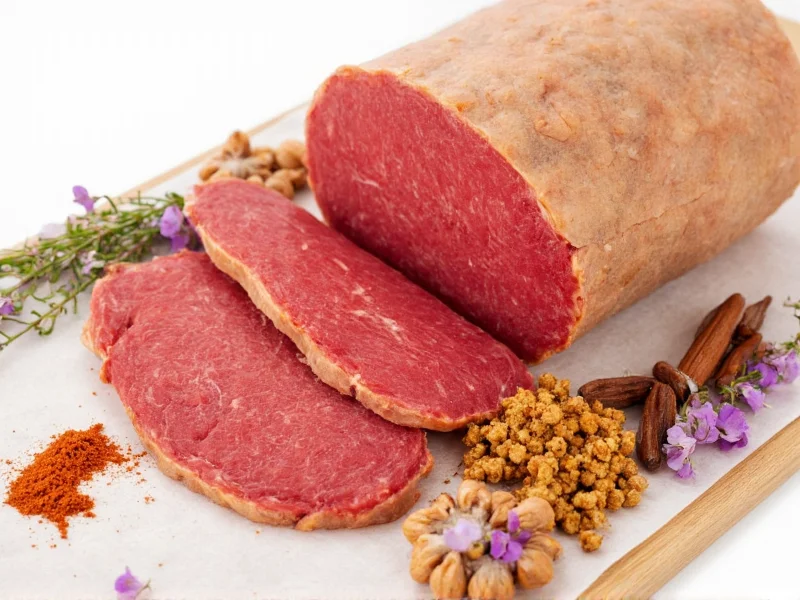When preparing corned beef, selecting the right spices isn't just about flavor—it's about creating the authentic experience that makes this dish special. The traditional spice blend works synergistically to cut through the richness of the beef while enhancing its natural flavors. Understanding which spices for corned beef work best and why they matter can transform your cooking from ordinary to exceptional.
The Traditional Corned Beef Spice Foundation
Corned beef's distinctive taste comes from a carefully balanced spice mix that has evolved over centuries of culinary tradition. While many store-bought corned beef kits include pre-packaged spice blends, creating your own homemade corned beef seasoning gives you control over flavor intensity and allows customization based on personal preference.
Core Spices for Corned Beef: A Detailed Breakdown
Each component in the traditional corned beef spice mix serves a specific purpose in developing the final flavor profile. Understanding these roles helps you adjust proportions to suit your taste preferences while maintaining authenticity.
Mustard Seeds
Mustard seeds provide the signature tangy note that defines corned beef. Yellow mustard seeds offer milder flavor, while brown or black varieties deliver more pungency. When heated in the brine, they release compounds that help tenderize the meat while contributing their distinctive sharpness. For best results, use whole seeds rather than ground mustard to prevent cloudiness in your brine.
Coriander Seeds
Often overlooked but essential, coriander seeds add a subtle citrusy note that balances the heavier spices. Their light, lemony flavor cuts through the fat of the brisket, creating complexity without overpowering other elements. Lightly toasting coriander seeds before use enhances their aromatic properties significantly.
Allspice Berries
Despite their name, allspice berries aren't a blend but a single spice that tastes reminiscent of cinnamon, cloves, and nutmeg combined. In corned beef preparation, they provide warm, sweet undertones that complement the saltiness of the cured meat. Use whole berries rather than ground allspice to prevent bitterness during the long cooking process.
Cloves
Cloves deliver intense aromatic warmth that penetrates the dense muscle fibers of brisket. Their eugenol content helps preserve the meat while contributing distinctive flavor. Be careful with quantity—too many cloves can dominate the entire dish. Eight to ten whole cloves typically suffice for a standard cut of corned beef.
Bay Leaves
Bay leaves provide herbal complexity that develops slowly during cooking. Unlike other spices, they're not about immediate flavor but about building depth over time. Use dried bay leaves rather than fresh, as fresh varieties contain compounds that can become bitter when cooked for extended periods.
Peppercorns
A blend of black, white, and pink peppercorns creates the ideal heat profile for corned beef. Black peppercorns offer robust heat, white provides earthiness, and pink adds floral notes. Whole peppercorns maintain their flavor integrity throughout the cooking process better than pre-ground pepper.
Alternative Spices for Customizing Your Corned Beef
While the traditional blend works beautifully, certain variations can accommodate different taste preferences or dietary needs. These alternatives maintain the spirit of corned beef while offering distinctive twists.
| Spice Variation | Best For | Recommended Quantity |
|---|---|---|
| Dill Seed | Adding fresh, grassy notes | 1 teaspoon per 3-4 lb cut |
| Red Pepper Flakes | Mild heat lovers | 1/4-1/2 teaspoon |
| Star Anise | Asian-inspired variations | 1 star per 3-4 lb cut |
| Fennel Seeds | Sweetness and complexity | 1 teaspoon |
Spice Preparation Techniques That Make a Difference
How you prepare and incorporate spices significantly impacts the final flavor of your corned beef. Professional chefs use specific techniques to maximize spice effectiveness:
Dry Toasting: Lightly toasting whole spices in a dry pan before adding them to your brine releases essential oils and intensifies flavors. Heat spices over medium-low for 1-2 minutes until fragrant, being careful not to burn them.
Spice Bag Method: Using a cheesecloth or muslin bag keeps spices contained for easy removal after cooking. This prevents small seeds from scattering throughout your finished dish while allowing full flavor extraction.
Layered Addition: Add hard spices like seeds and berries at the beginning of cooking, but introduce delicate elements like fresh herbs during the last hour to preserve their volatile compounds.
Common Spice Mistakes to Avoid
Even with the right spices for corned beef, improper usage can compromise your results. Watch for these common pitfalls:
- Using pre-ground spices - Ground spices lose potency quickly and can become bitter when cooked for extended periods
- Overloading the spice mix - More isn't better; balance is key to authentic corned beef flavor
- Adding spices too late - Spices need time to infuse the meat properly during the cooking process
- Ignoring regional variations - Irish-style corned beef traditionally uses simpler spice profiles than American versions
Creating Your Perfect Homemade Corned Beef Spice Blend
For those seeking the ideal spices that complement corned beef, here's a professional-grade blend you can customize:
Basic Traditional Blend (for 3-4 lb brisket):
- 1 tbsp yellow mustard seeds
- 1 tbsp coriander seeds
- 1 tsp allspice berries
- 8-10 whole cloves
- 2-3 bay leaves
- 1 tbsp mixed peppercorns
Spicy Variation: Add 1/4 teaspoon red pepper flakes and 1/2 teaspoon dill seeds to the basic blend
Sweet Variation: Include 1 small cinnamon stick and 1 star anise with the basic blend
Store any extra spice blend in an airtight container away from light for up to six months. Properly stored, your homemade corned beef seasoning maintains peak flavor much longer than commercial packets.











 浙公网安备
33010002000092号
浙公网安备
33010002000092号 浙B2-20120091-4
浙B2-20120091-4